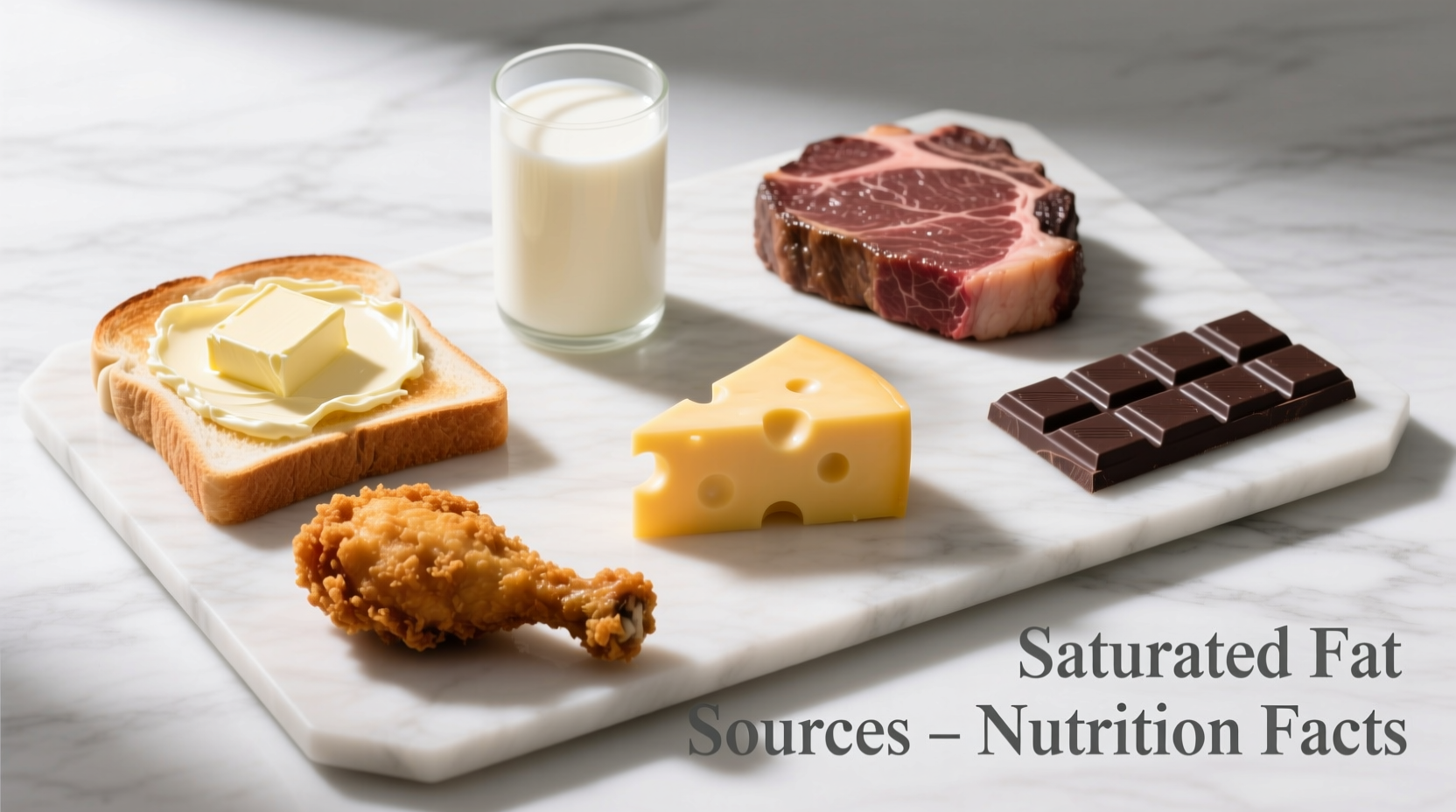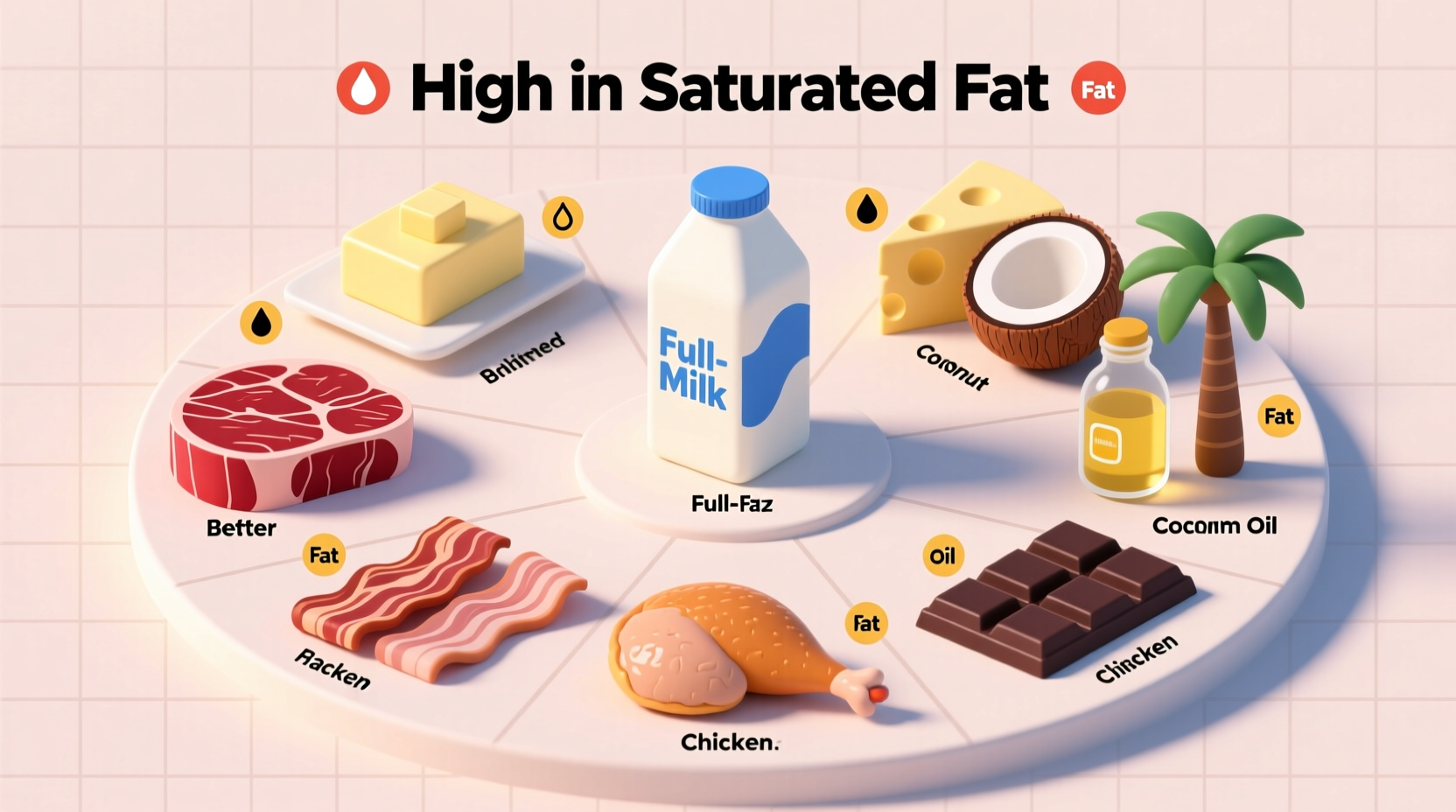Understanding Saturated Fat in Your Diet
When you're evaluating your dietary habits, knowing which foods contain high levels of saturated fat helps you make informed decisions about your nutrition. Saturated fats are typically solid at room temperature and primarily come from animal sources and certain tropical oils. While your body needs some fat for proper functioning, excessive saturated fat intake has been linked to increased LDL ("bad") cholesterol levels and higher risk of heart disease.
Top Food Categories High in Saturated Fat
Let's break down the major food categories where saturated fat commonly appears, so you can identify potential sources in your daily meals.
Animal Fats and Dairy Products
Animal-based products represent the largest category of saturated fat sources in typical Western diets. Beef tallow contains approximately 50% saturated fat, while pork lard contains about 40%. Full-fat dairy products are significant contributors:
- Butter: 51% of its fat content is saturated
- Cheddar cheese: Contains about 6g of saturated fat per ounce
- Whole milk: Approximately 3.5g of saturated fat per cup
- Cream: Heavy cream contains 5.4g of saturated fat per ounce
Tropical Oils
Despite being plant-based, certain tropical oils are surprisingly high in saturated fats:
- Coconut oil: 82% of its fat content is saturated
- Palm oil: Contains 49% saturated fat
- Palm kernel oil: Even higher than regular palm oil at 82% saturated fat
Processed and Fast Foods
Many convenience foods contain high levels of saturated fat due to their preparation methods and ingredients:
- Fried foods (especially those cooked in palm or coconut oil)
- Commercial baked goods (pastries, cookies, cakes)
- Pizza (particularly cheese and meat varieties)
- Processed meats (sausages, hot dogs, bacon)
- Some coffee creamers and non-dairy creamers
| Food Item | Serving Size | Total Fat (g) | Saturated Fat (g) | % Daily Value* |
|---|---|---|---|---|
| Butter (salted) | 1 tbsp (14g) | 11.5 | 7.2 | 36% |
| Cheddar cheese | 1 oz (28g) | 9.0 | 6.0 | 30% |
| Coconut oil | 1 tbsp (13.6g) | 13.6 | 11.2 | 56% |
| Beef ribeye steak | 3 oz (85g) | 22.0 | 9.0 | 45% |
| Palm oil | 1 tbsp (13.6g) | 13.6 | 6.7 | 34% |
*Based on a 2,000 calorie diet with recommended daily limit of 20g saturated fat
Visual Guide to Saturated Fat Sources

Health Implications and Dietary Guidelines
The American Heart Association recommends limiting saturated fat to no more than 5-6% of total daily calories. For a 2,000-calorie diet, this means consuming no more than 11-13 grams of saturated fat per day. Research from the Centers for Disease Control and Prevention shows that replacing saturated fats with unsaturated fats can reduce the risk of heart disease by up to 30%.
It's important to understand that not all saturated fats affect health in exactly the same way. The Harvard T.H. Chan School of Public Health notes that the health impact depends on the specific fatty acids, the food matrix they're in, and what they're replacing in the diet. For example, dairy fats may have different effects than processed meat fats.
Practical Dietary Swaps for Healthier Fats
You don't need to eliminate fats entirely—strategic substitutions can significantly reduce your saturated fat intake while maintaining flavor and satisfaction:
- Replace butter with olive oil or avocado oil in cooking
- Choose lean cuts of meat and remove visible fat
- Opt for low-fat or fat-free dairy products
- Use avocado or nut butters instead of butter on toast
- Snack on nuts and seeds rather than processed baked goods
- Select fish and poultry more often than red meat
Remember that completely eliminating fats isn't advisable, as your body needs certain fats for proper hormone production, vitamin absorption, and cell function. The key is choosing predominantly unsaturated fats from sources like olive oil, avocados, nuts, seeds, and fatty fish.
Reading Nutrition Labels Effectively
When evaluating packaged foods, focus on both the saturated fat content and the ingredient list. Be aware that products labeled "low fat" sometimes compensate with added sugars. Check for hidden sources of saturated fat like:
- Palm oil
- Hydrogenated oils
- Cream or cheese derivatives
- Coconut derivatives
The USDA FoodData Central database provides comprehensive nutritional information for thousands of foods, allowing you to compare options and make informed choices based on actual data rather than marketing claims.
Frequently Asked Questions
What are the top 5 foods highest in saturated fat?
The top 5 foods highest in saturated fat are coconut oil (82% saturated fat), butter (51%), palm oil (49%), beef fat/tallow (50%), and full-fat cheese varieties like cheddar. Processed meats, baked goods made with shortening, and fried foods prepared with tropical oils also contain significant amounts of saturated fat.
How much saturated fat should I eat daily?
The American Heart Association recommends limiting saturated fat to 5-6% of your total daily calories. For a standard 2,000-calorie diet, this means no more than 11-13 grams of saturated fat per day. People with existing heart conditions or high cholesterol may need to limit intake further under medical guidance.
Are all saturated fats equally bad for health?
Research suggests not all saturated fats affect health identically. The impact depends on the specific fatty acids, the food matrix they're in, and what they replace in the diet. For example, dairy fats may have different health implications than processed meat fats. However, current dietary guidelines still recommend limiting all sources of saturated fat and replacing them with unsaturated fats when possible.
Can I still eat foods high in saturated fat occasionally?
Yes, occasional consumption of foods high in saturated fat can fit within a balanced diet. The key is moderation and overall dietary pattern. For most healthy adults, having a cheeseburger or buttered pastry once in a while won't significantly impact health if the majority of your diet consists of whole foods, fruits, vegetables, and healthy fats. The concern arises from regularly consuming high amounts of saturated fat as part of your daily eating pattern.











 浙公网安备
33010002000092号
浙公网安备
33010002000092号 浙B2-20120091-4
浙B2-20120091-4